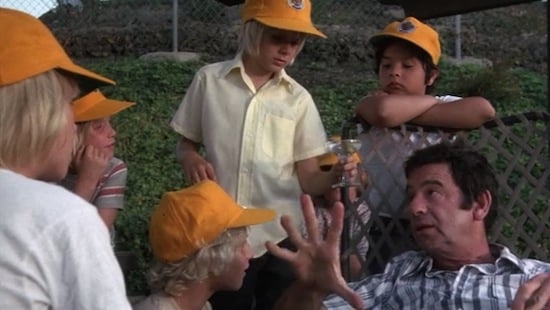Shocking Blocking (32)
By:
August 9, 2012

How to choose a single revealing scene from a movie — whose theme is the complex interplay between alienation and redemption — in which there isn’t a single un-great scene? Here’s how: I employed the Husserlian technique known as the “unpacking” of a phenomenon via epoché (or “bracketing”). Excluded from consideration, therefore, were all the movie’s obviously meaningful moments — e.g., any scene featuring Amanda, who symbolizes the bonds of conventional society that washed-up minor-league pitcher Morris Buttermaker (Walter Matthau) has escaped; or Kelly, who symbolizes Buttermaker’s own outsiderhood; or corrupt Coach Turner, who symbolizes the cruel social order that Buttermaker rejects; and importantly, any ballfield scene whatsoever. We arrive, then, at a forgetabble scene, early in the movie, in which Regi, Toby, Timmy Lupus, Engelberg, Jose and Miguel, Jimmy, Ogilvie, Rudi, Tanner, and Ahmad listen with rapt attention to Buttermaker’s baseball stories. Cynicism forgotten, Buttermaker reminisces about his curveball — which vanished when it crossed the plate! His hand makes a poetic vanishing gesture… at which point Lupus fills that hand with a martini. Buttermaker is an alienated cynic teetering on the edge of redemptive idealism; the misfit Bears are idealistic kids fast approaching the abyss of cynicism. The message of this scene? In life, as in baseball, things can always get better. Or worse.
An occasional series analyzing some of the author’s favorite moments in the positioning or movement of actors in a movie.
THIRTIES (1934–1943): It Happened One Night (1934) | The Man Who Knew Too Much (1934) | The Guv’nor (1935) | The 39 Steps (1935) | Young and Innocent (1937) | The Lady Vanishes (1938) | Mr. Smith Goes to Washington (1939) | The Big Sleep (1939) | The Little Princess (1939) | Gone With the Wind (1939) | His Girl Friday (1940)
FORTIES (1944–1953): The Diary of a Chambermaid (1946) | The Asphalt Jungle (1950) | The African Queen (1951)
FIFTIES (1954–1963): A Bucket of Blood (1959) | Beach Party (1963)
SIXTIES (1964–1973): For Those Who Think Young (1964) | Thunderball (1965) | Clambake (1967) | Bonnie and Clyde (1967) | Madigan (1968) | Wild in the Streets (1968) | Barbarella (1968) | Harold and Maude (1971) | The Mack (1973) | The Long Goodbye (1973)
SEVENTIES (1974–1983): Les Valseuses (1974) | Eraserhead (1976) | The Bad News Bears (1976) | Breaking Away (1979) | Rock’n’Roll High School (1979) | Escape from Alcatraz (1979) | Apocalypse Now (1979) | Caddyshack (1980) | Stripes (1981) | Blade Runner (1982) | Tender Mercies (1983) | Monty Python’s The Meaning of Life (1983)
EIGHTIES (1984–1993): Repo Man (1984) | Buckaroo Banzai (1984) | Raising Arizona (1987) | RoboCop (1987) | Goodfellas (1990) | Candyman (1992) | Dazed and Confused (1993) |
NINETIES (1994–2003): Pulp Fiction (1994) | The Fifth Element (1997)
OUGHTS (2004–13): Nacho Libre (2006) | District 9 (2009)
Joshua Glenn’s books include UNBORED: THE ESSENTIAL FIELD GUIDE TO SERIOUS FUN (with Elizabeth Foy Larsen); and SIGNIFICANT OBJECTS: 100 EXTRAORDINARY STORIES ABOUT ORDINARY THINGS (with Rob Walker).
